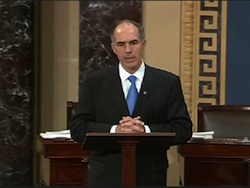Sen. Franken, Casey and Kaufman Voice Support for New START Treaty
March 19, 2010
Featured Image
We are happy to serve you a daily summary of the day's top nuclear policy stories each morning, with excerpts from the stories in bullet form.
Stories we're following today:
Franken, Casey and Kaufman Praise New START Treaty - Council for a Livable World [link]
- SEN. AL. FRANKEN. Madam President, I rise today to speak about arms control and the President's negotiations with Russia over a replacement to the Strategic Arms Reduction Treaty, or START. This new treaty will be an important enhancement to American national security, and I look forward to considering it on the Senate floor once it has been signed.
- SEN. ROBERT CASEY. A new START agreement is in our national security interests, especially in terms of maintaining verification and transparency measures. Once complete, this agreement could help to strengthen the U.S.-Russian relationship and potentially increase the possibility of Russian cooperation on an array of thorny and grave international issues, including North Korea and Iran.
- SEN. RICHARD KAUFMAN. The Senate should take action on a START follow-on treaty as soon as possible in order to keep Americans safe and protect global security. For anyone who has doubts, rest assured that the President and his negotiating team are working hard to finalize a treaty that first and foremost must advance U.S. security interests.
U.S., Russian Negotiators 'at the Finish Line' on New START Nuclear Pact - Washington Post [link]
- U.S. and Russian negotiators are "at the finish line" in negotiating a major agreement to cut the number of nuclear warheads each side has deployed against the other, with just one or two issues left to resolve, officials said Thursday.
- Secretary of State Hillary Rodham Clinton and the Russian foreign minister said after talks here that they awaited word soon from negotiators in Geneva who have been working 18-hour days to wrap up the agreement.
White House Revising Executive Summary of Nuclear Document - Marc Ambinder in The Atlantic [link]
- The long-awaited review of the United States nuclear posture has reached its final stage, with the White House taking ownership of an executive summary and preparing for a public release in several weeks' time.
- Two senior administration officials, Derek Chollet of the State Department's Office of Policy Planning and Jim Miller, the Defense Department's principal deputy undersecretary for policy, submitted an executive summary of the Nuclear Posture Review after a meeting last Friday.
- President Obama has seen a draft of the summary, and his National Security Staff is working through the document. Administration officials said that most of the critical issues had been settled, and that broad consensus about topics like the overall aims of the government's "declaratory policy' on nuclear weapons had been reached, but the angels are in the details, and Obama's own imprint -- and ultimately the degree to which the document is seen as a radical statement of principles -- will matter most.
- The administration intends to release an unclassified version of the N.P.R. by early April, before a nuclear non proliferation summit in Washington.
Powell Says New Sanctions on Iran Won't Stop Nuclear Program - Bloomberg [link]
- Former U.S. Secretary of State Colin Powell said new sanctions on Iran to persuade it to stop enriching uranium won’t work because the Islamic republic is “determined to have a nuclear program.”
- “I don’t see a set of sanctions coming along that would be so detrimental to the Iranians that they are going to stop that program,” Powell said in an interview with Bloomberg special contributor Judy Woodruff. “So ultimately, the solution has to be a negotiated one.”
Profit and 'Peril' in the Secret Nuclear Trade - NPR's Fresh Air [link]
- "Most people are horrified of nuclear weapons," said David Albright, author of Peddling Peril and president of the Institute for Science and International Security (ISIS). "They understand the danger of them. But if they're being asked to buy or sell some vital piece of equipment that costs millions of dollars, then some of the concern is diminished, and they're kind of willing to turn a blind eye.
- "I think al-Qaida is going to work very hard to try to get one. And the more countries that get nuclear weapons — or the more countries working to get nuclear weapons — then al-Qaida's chances improve. They need the nuclear explosive material, and they're going to have to get it, and that's not easy. They're also going to learn how to make a nuclear weapon, at least a crude one that would work for them."
- Listen to the full interview below:
- Note: ISIS is a Ploughshares Fund grantee.



